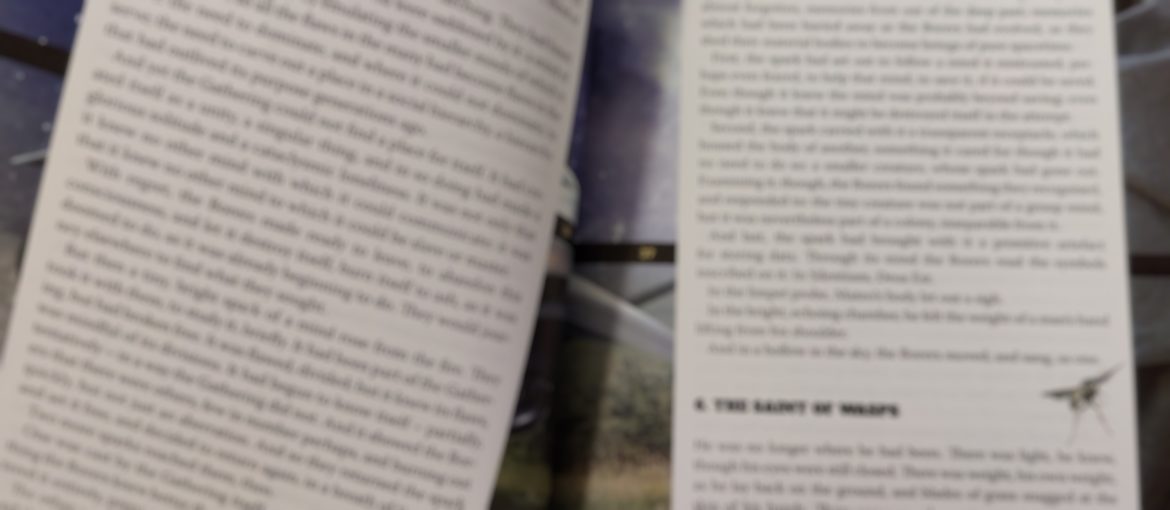The Kindest God is Light, Joanna Berry. A depressed poet is stationed at an alien psychological treatment facility as part of a diplomatic endeavour. Alongside a select number of other human beings, this poet has been asked to sync with a device called an Echo, which will record the full range of their emotional personality. The poet blames themselves for their inability to achieve sync, particularly in contrast to those at the facility who are actually receiving treatment. To move forwards, they must revisit the fundamental reason why they are here. Strong writing and an optimistic message.
She and I and We, Timothy Mudie. A struggling young poet – hang on, another one?! – believes that she is being stalked by an older woman, and confronts her. She’s quite right: she is being followed, but the woman claims that it is to protect her, and further that she is the future version of the poet. The poet believes her. When a third party enters the game, and the poet’s life is threatened, the truth will out. A fun story about reservation and obsession though the poet’s occupation plays no role. The closing moments of the story are the nicest touch.
Dent-de-lion, Natalia Theodoridou. A tired space exploration (and exploitation?) outfit has sent a pair of astronauts to a remote planet in search of a cure for “Flower Flu”. Both the organisation and its staff have seen better days. What they find planetside contains secrets beyond the hoped-for cure. A simple story that seems like a classic SF mystery, though the focus is more upon human hopes and fears than it is unpicking the secrets of alien biology. I enjoyed it.
Parasite Art, David Tallerman. A human artist has bonded with a creature called a Zobe; a symbiotic lifeform with a lifespan measured in millennia. These creatures share with their hosts the memories of their myriad past lives, and during these dreams of memory the host can enter a sort of narrowly-focused fugue state. These characteristics and states of being make Zobe-pairing particularly attractive to artists, who routinely produce masterworks that leave non-Zobe art seeming pale and shallow by comparison. Our protagonist shines brightly, but has begun to question the loss of individuality and the near-absolute conformity inherent in bonding with the territorial and antisocial Zobe. The conclusion is somewhat open and raw, inviting personal responses, and focused on a sense of absence. An interesting story that is provocative about art and selfhood.
The Duchess of Drinke Street, Tim Chawaga. This shares the same broad setting as The Fukinaga Special Chip Job (IZ #279), which I wasn’t keen on. I like this story more, focusing as it does on the value of food both as a memory trigger and in local culture. The interplay between protagonist and sort-of-antagonist is good, and I like that the story touches upon gentrification pushing out what made the food culture of a place unique in the first place. I like less that the city’s most famous food critic is opposed to gentrification and “tourists” eating in “local” eating areas, and at no point does anyone question the role of famous critics in driving such phenomenon. This is having your cake, eating it too, then leaving a bad review on Yelp. Nor does the story question what it means for a critic to champion food “authenticity” in the context of culinary hybridity and fusion. The story implicitly suggests that authenticity is a byproduct of class, so this is frustrating only in that the story under-develops the interesting ideas lurking right beneath the surface.
Dream of the High Mountain, Daniel Bennett. A dying planet, a man trying to understand his reactions to it. An introspective story set in an introspective place: a retreat promising “inner space, not outer space”. Elsewhere in the world the rich freeze reproductive materials and shoot them into space; some sort of project attempting to perpetuate the human species, otherwise marooned on the planet that it – its rich – have brought to ruin. Ennui and uncertainty dominate. It’s a moody story, but also feels disagreeably idle and passive. The secondary character Elena, who seems to exhibit some motivation and anger, is more interesting than the alienated and vaguely guilty protagonist. Nice character writing overall.

